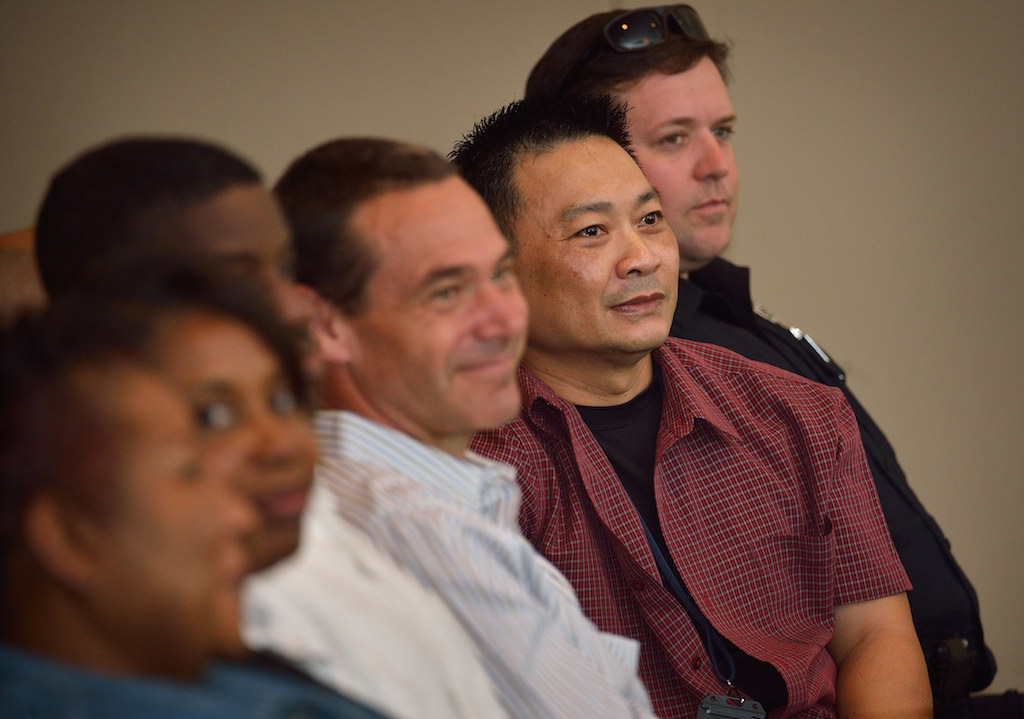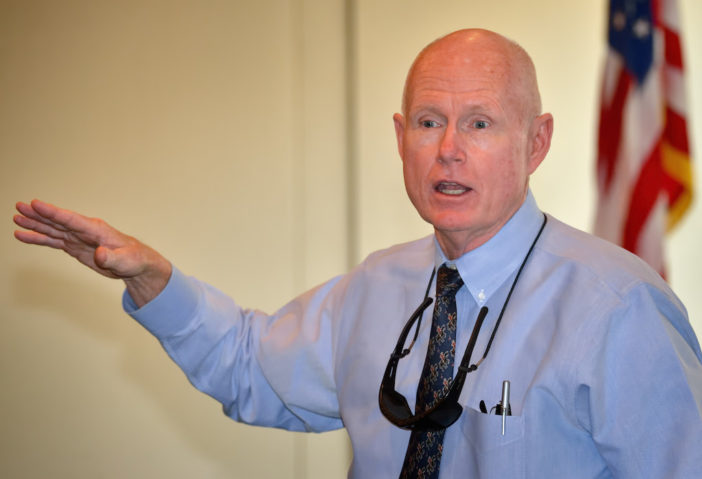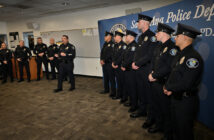“Most of you are not going to survive this job,” Dr. Kevin Gilmartin announces to the audience.
The statement comes with little reaction from the more than 50 officers listening.
Those who sign on to wear a badge already know that on any given day they may find themselves in a life-and-death situation that could take a turn for the worst.
Gilmartin, a behavioral scientist and former cop, wasn’t there to prepare them for those kinds of risks — the academy handles that.
How to survive the parts of the job that infiltrate an officer’s family life and health is Gilmartin’s speciality.
“We don’t teach our cops to take care of themselves,” he said. “We have an epidemic in the U.S. and nobody wants to talk about it.”

Officer Nick Tran of the Westminster PD, second from right, listens to a talk by Dr. Kevin Gilmartin on emotional survival for law enforcement during a seminar at the Rose Center in Westminster.
Photo by Steven Georges/Behind the Badge OC
Gilmartin taught four courses over two days at the Westminster Rose Center for dozens of officers from Westminster, Tustin, Anaheim and the Orange County Sheriff’s Department.
Westminster Police Chief Kevin Baker scheduled the training saying he recognized some in his department could benefit from learning how to better handle the stress of the job.
“Over the last few years, I saw a lot of employees worrying about things that were out of their control,” Baker said. “I want to at least give them the tools to handle this part of their job — the part nobody talks about.”
Depression, apathy and isolation are sometimes the unintended, and unspoken, consequences of being over-invested in working the job, according to Gilmartin.
Baker said he read Gilmartin’s book in 2003 and it changed the way he approached his law enforcement career.
“I personified what (Gilmartin) describes as the over-invested cop,” Baker said. “My personal life suffered and I had a cynical perspective.”
Learning how to detach when his workday ended drastically changed Baker’s life.
“Perspective and balance is everything. I had been out of balance for years,” he said. “Finally, my eyes were opened. I was able to rest, I started to enjoy myself more, I was friendlier with my family, and I became a more effective police officer in the long run.”
Gilmartin calls managing this aspect of police work emotional survival and he says it’s equally as important as tactical training.
Failing to have tools in this trade can lead to death as effectively as exchanging gunfire with a felon, though not as quickly.
Law enforcement as an industry is plagued with heart attacks, diabetes, sleep disorders, depression and even suicide, Gilmartin said.
“It’s very rare that I go to a police department that hasn’t been touched by suicide,” he said. “The skills that make you a good cop are destructive.”
For an officer to be good at his or her job, they need to always be on high-alert and skeptical of their surroundings and the people they come in contact with, Gilmartin said.
“All day long cops get called when something is wrong,” Gilmartin said. “Constantly, every day (officers) deal with people who lie.
“Cops do not survive by trust.”
Officers operate with high cortisol and epinephrine levels to stay sharp and ready for split-second decisions on the streets.
When those hormones plummet at shift’s-end, many don’t know how to normalize.
“This is what absolutely destroys (officers),” he said. “This process puts (officers) in an early grave, and I don’t want it to.”
Gilmartin tasked the officers in the room with putting their energy into better managing their personal time, focusing on physical fitness and dedicating off-duty hours to family and hobbies.
“Cops have to see the world differently than other people do, and there’s a liability that comes with that,” he said. “When you teach someone street survival, you need to teach them emotional survival as well.”
 Behind the Badge
Behind the Badge



